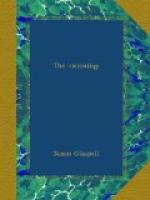Ann and Captain Prescott were coming toward them. She had never looked less like a girl in a dream. Laughing and jesting with her companion, she looked simply like an exceedingly pretty girl having a very good time.
“But you like Ann, don’t you, Wayne?” Katie asked anxiously.
“Yes,” said Wayne, “I like her.”
She came running up the steps to them, flushed, happy, as free from self-consciousness as Worth would have been. “Katie,” she cried, “I played the last one in four. Didn’t I?” turning proudly to the Captain for endorsement.
Both men were looking at her with pleasure: cheeks flushed, eyes glowing, hair a little disheveled and a little damp about the forehead, panting a little, her lithe, beautiful body swaying gently, hands outstretched to show Wayne how she had hardened her palms, Ann had never seemed so lovely and so live. In that moment it mattered not whether one knew anything about the earning capacity of her father or the culinary abilities of her mother. She was real. Real as sunshine and breezes and birds are real, as Worth and the puppies tumbling over each other on the grass were real, as all that is life-loving is real. And not detached, not mistily floating, but moored to that very love of life, capacity for life, to that look she had awakened in the faces of the men to whom she was talking. It seemed a paltry thing just then to wonder whether Ann was child of farmer, or clothing merchant, or great artist. She was Life’s child. Love’s child. Love’s child—only she had not dwelt all her days in her father’s house. But it was her father’s house; that was why, once warmed and comforted, she could radiantly take her place. Watching her as she was going over her game for Wayne, demonstrating some of her strokes, and her slim, beautiful body made even the poor strokes wonderful things, Katie was not speculating on whether Ann had come from Chicago, or Florence, or Big Creek. She was thinking that Ann was product, expression, of the love of the world, that love which had brought the laughter and the tears, brought the hope and the radiance and the tragedy of life.
And then, suddenly and inexplicably, Katie was afraid. Of just what, she did not know; of things—big, tempestuous things—which Katie did not very well understand, and which Ann—perhaps not understanding either—seemed to embody. “Come, Ann,” she said, “we must make ready for dinner.”
Captain Prescott called after them that next he was going to teach Ann to ride. “Oh, we’ll make an army girl of her yet,” he laughed.
Ann turned back. “Do you know,” she said, “I don’t understand the army very well. Just what is it the army does?”
They laughed. “Ask the peace society in Boston,” suggested Prescott.
But Wayne said: “Some day soon you and I’ll take a ride on the river and I’ll deliver a little lecture on the army.”
“Oh, that will be nice,” said Ann radiantly.




